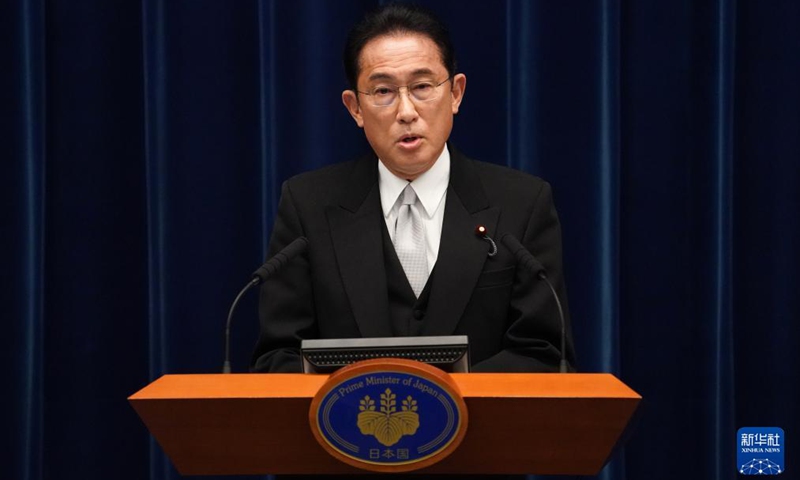Strong message of commitment from Biden could just be Kishida’s personal interpretation: expert

Japan's new Prime Minister Fumio Kishida speaks during a press conference at prime minister's official residence in Tokyo, Japan, on Oct. 4, 2021. (Toru Hanai/Pool via Xinhua)
New Japanese Prime Minister Fumio Kishida said on Tuesday that he received a “strong” message from US President Joe Biden about the US’ commitment to defending the Diaoyu Islands in phone talks on Tuesday morning, according to Reuters. In the talks, Biden strongly committed “to the defense of Japan, including the application of Article 5 of the Japan-US security treaty to the Senkakus (China’s Diaoyu Islands),” Kishida told reporters after the conversation, Kyodo News reported.
Talks between top leaders of Japan and the US mentioning the Diaoyu Islands and the application of Article 5 to the Diaoyu Islands are not a new topic, and has become part of the well-worn talking points shared between US and Japanese leaders.
The readout of the call released by the White House however did not mention the above-mentioned information. There is a possibility that the so-called “strong” message is simply Kishida’s personal interpretation. Yet the message at least suggests the US is being more proactive in defending the Diaoyu Islands.
Kishida’s China policy has two sides. He heads Kochikai, one of the ruling Liberal Democratic Party’s oldest factions, which has a long pro-China tradition. At the same time, influenced by the rightward shift of Japanese politics, Kishida himself also has a tough side when it comes to some policies concerning China. In terms of the Diaoyu Islands, Kishida recently stressed that it was “important” to re-examine and perhaps revise laws governing interoperability between the Self-Defense Forces and the Japan Coast Guard.
Objectively, China and Japan will maintain the status quo of the Diaoyu Islands, and over the foreseeable future, the US and Japan are not likely to take aggressive measures to change it. But Washington and Tokyo may increase their joint military drills around the Diaoyu Islands. What Washington and Tokyo consider is not merely the defense of the Diaoyu Islands, but also the waters around the island of Taiwan. By taking advantage of defending the Diaoyu Islands, the US and Japan may intend to deter China when it comes to the Taiwan question.
Observers have pointed out that Kishida hyped the Taiwan question during the presidential election campaign, but did not mention Taiwan in this call with Biden. This call is a courtesy one to congratulate Kishada after being elected the new prime minister. During such a call, only vital issues for both countries are discussed, such as the strength of the US-Japan alliance, and their cooperation in the Indo-Pacific region. It is clearly that both countries have not placed the Taiwan question at a critical position.
Furthermore, the potential ease of China-US relations was to some extent embodied in the phone conversation between Biden and Kishida. Huawei's CFO Meng Wanzhou has returned to China. US Trade Representative Katherine Tai on Monday said the US will start a targeted tariff exclusion process. In comparison to previous flare ups between China and US, their bilateral relations have not been further worsened. Against this backdrop, Washington may be reluctant to provoke China further.
During Kishida’s term, Japan’s cooperation with the US in military and security sphere will continue. But given the sharp changes of regional order in East Asia, it will be difficult for Washington and Tokyo to maintain their hegemony in the region. This can explain why Japanese former prime minister Yoshihide Suga insisted on attending the Quad summit only days before stepping down. During the phone call with Kishida, Biden also talked about strengthening the relationship with Japan through the Quad, according to the White House. Kishida is anticipated to continue deepening the Quad mechanism as a part of Japan’s diplomatic policy and national strategy.
What kind of China policy Kishida will formulate has become a heated topic over recent days. However, it seems that he has not yet formed an evident and clear China policy. Despite often being viewed as a dove, Kishida made use of hardline and aggressive rhetoric against China during his election campaign. The new prime minister may be still in the process of strategizing or exploring a suitable China policy. Meanwhile, Japan’s China policy will be affected by the US’ China policy as well. If China-US bilateral ties ease, Japan’s relations with China will follow as a response.
The author is an associate research fellow at the Center for Japanese Studies, Fudan University. opinion@globaltimes.com.cn
